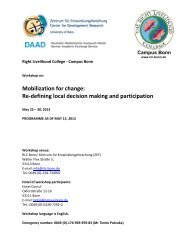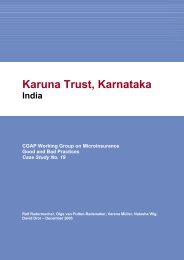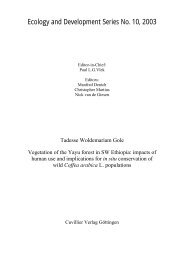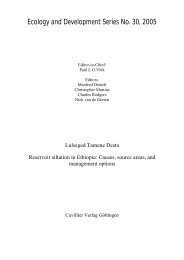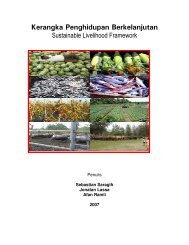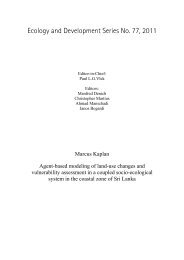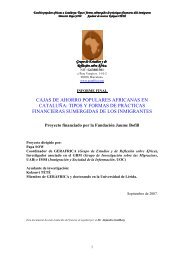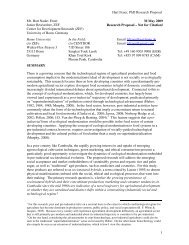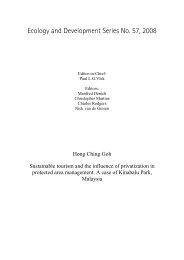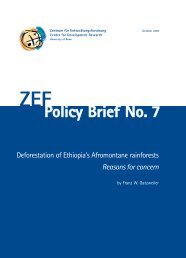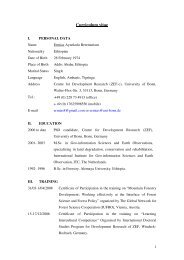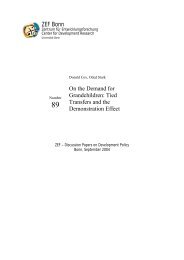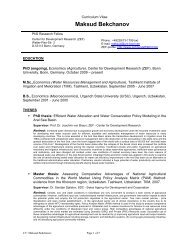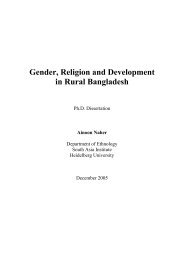ZEF Bonn
ZEF Bonn
ZEF Bonn
You also want an ePaper? Increase the reach of your titles
YUMPU automatically turns print PDFs into web optimized ePapers that Google loves.
1.1.3 Constitutional draft for Burma/Myanmar<br />
The constitutional constraints between minority claims, decentralist structures and<br />
the central government were analysed in Burma/Myanmar on behalf of the Friedrich<br />
Ebert Foundation and the exile government of Burma. The constitutional draft<br />
wrote down the entitlements of ethnic groups and tried to find a balance of power<br />
between the centre and the federal states. Critical points emphasised by <strong>ZEF</strong> include<br />
the definition of ethnic identities in the Burmese context and the question of how<br />
to deal with various minorities and their claims in the future.<br />
1.1.4 Afghanistan - The ethnicisation of a conflict<br />
The project on ethnic conflicts in Afghanistan was strongly influenced by the terrorist<br />
attacks of September 11 and the American intervention in Afghanistan. The<br />
political landscape of Afghanistan with its clans, villages, valleys and brotherhoods is<br />
much more deeply divided than the usual maps showing ethnic groups suggest.<br />
Therefore, ethnicity explains only one dimension of the conflict and was mainly<br />
instrumentalised by political leaders. In order to underline this argument, <strong>ZEF</strong> accentuated<br />
its research on other aspects of the conflict such as the erosion of state<br />
structures and on the dominance of warlordism and patronage systems in the past<br />
decades. The findings of the project have flown into a discussion paper on reconstruction<br />
and peace-building in Afghanistan. <strong>ZEF</strong> emphasises that the first aim<br />
should be to strengthen state structures and to foster the role of the state in reconstruction<br />
programs. The paper has been well received within the international<br />
development community and stimulated discussions on the future of Afghanistan<br />
and other 'failed' states. The Heinrich Böll Foundation has organised a workshop<br />
with representatives of all the major German development institutions in order to<br />
discuss the paper and its recommendations.<br />
1.1.5 Beyond nationalism. Fostering peace and reconciliation between<br />
Yugoslavia's successor states<br />
This project looks at the historical memories of the dissolution of Yugoslavia presented<br />
by academics in Bosnia, Croatia and Serbia. A series of workshops will be<br />
held in the region in order to stimulate a new, non-nationalistic view of the dissolution<br />
and to encourage teams of academics of different national backgrounds to<br />
write essays together. The output of the workshops will consists of a edited volume<br />
containing these essays which will be used in university curricula in the<br />
region, thus offering a contrasting interpretation to the dominant nationalistic<br />
vision of recent history. The project thus also hopes to contribute to<br />
conflict prevention in the region. It will be supported by the German<br />
Foreign Ministry and the American Social Science Research Council.<br />
1.1.6 Pluralism in Southeast Asian Islam<br />
Since September 11, Islam has been the focus of a renewed public discussion<br />
in the Western world. Whether Islam has an inherent tendency to produce<br />
political radicalism has been just one of the many lines of debate. In<br />
this project, <strong>ZEF</strong> takes a different perspective by showing that in Southeast<br />
Asian Islam, the tradition of accommodating religious and ethnic pluralisms<br />
has led to the rise of a much more differentiated and diversified political<br />
doctrine of Islam compared to the one in the Arab Peninsula. It would<br />
thus be mistaken to relate certain forms of Islamism to the characteristics of<br />
Islamic religious thinking as such. The project is financed by a fellowship for<br />
professorial candidates of the Deutsche Forschungsgemeinschaft.<br />
Research<br />
In the framework of a project<br />
looking at the historical<br />
memories of the dissolution of<br />
Yugoslavia produced by academics<br />
in Bosnia, Croatia and<br />
Serbia, a series of workshops<br />
will be held in the region in<br />
order to stimulate a new, nonnationalistic<br />
view of the dissolution.<br />
Pluralism in<br />
South-East:<br />
Asian Islam<br />
45



